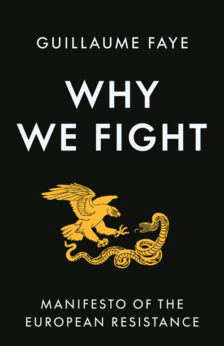I have just finished reading World magazine’s article “The Battle For America’s Identity,” and am pleasantly surprised by the author’s take. A few errors notwithstanding (equating the Charlottesville rally with racism, for example), the article has a generally open-minded and fair view with regard to the idea of a more theocratic state. Despite ending on a somewhat cautionary note, authors Sharon Dierberger and Emma Freire take an unprejudiced approach to the often-taboo topic of Christian nationalism.
This article is encouraging to me because, as a Christian myself, I am continually discouraged by the political weakness and lack of backbone often displayed by my fellow believers. I remember (as many do, no doubt) the common dining room discussion Christians had in 2016 regarding their unwillingness to vote for Trump on moral grounds. These discussions would often sound something like this: “I really don’t like Hillary, but I can’t vote for Trump in good conscience because of his morals.”
Idiocy.
Christians are slow to accept the fact that, as residents of a non-theocratic nation, we will always have to choose between the lesser of two evils. Candidates like Ben Carson, Rick Santorum, and Mike Huckabee are common rallying points for the evangelical voting bloc, but have next to no practical electability.
The article by World mentions two well-known Christian figures (Kevin DeYoung and John Piper) who state their opposition to the idea of Christian nationalism, and the statement by Piper in particular is revealing of the mind of far too many evangelicals. Piper discourages Christians from making the government their “sword” in advancing the kingdom of Christ. This is absurdity, and a short lesson in history would serve to show these men their error. Having grown up in the fundamental Christian world myself, I remember the idolization (not entirely erroneous, for the record) of governments like Oliver Cromwell’s and similar rulers. These men are held up as examples of good, Godly, Christian leadership, and as men who steered their nations towards a greater collective Godliness and greatness.
Returning to what I said about Christian voters, these people are unable to reconcile their desire for good Christian leadership and their desire to avoid all appearance whatsoever of any measure of “push” towards non-believers. The result of this sad impotence is a collective inability by our nation’s largest potential voting bloc1 to actually accomplish anything besides a few half-hearted measures which inevitably sputter out in failure.
In practical terms, there is a disconnect between the evangelical world’s stated desire to see society live in a more Christian fashion and their unwillingness to take any decisive measures whatsoever toward achieving that goal. Ironically, one of the most divisive conservative victories of the past few years (that of the abortion issue) consists of exactly what evangelicals are so averse to doing (that being to tell someone what they can or cannot do with their life). For most Americans, their views on gay marriage, drug use, and other such issues are intrinsically linked to their having or not having a Judeo-Christian morality. Yet Christians who hold entirely conservative views on these issues are loathe to consider any sort of “enforced” morality which would entail their views being imposed on others.
Man needs rules, and he needs guidance. Unchecked human nature is to trend towards license and licentiousness. Christians understand this, even if on a subconscious level, because we see the God of the Bible carry out his plan for humanity precisely in relation to the Levitical law, which predominates the Old Testament. It is an unfortunate fact that so many Christians recognize and believe this to one degree or another but are still unwilling to vote in a way that would hold others accountable to any sort of higher ethical standard to help society trend in a positive direction with regard to morality.
From a wider perspective, this weakness of political will is harmful with regard to the Kingdom of God as well. If, as Christians, one of our goals here on this Earth is the winning of souls for Christ, then a Christian society living by Christian rules would be an excellent way to make that goal more feasible. The World article briefly touches on this concept, mentioning the topic of Sabbath laws in saying “[w]hile no one would be compelled to go to church, the closure of many businesses would remove obstacles for those who do worship. It would also send a message that God ordained a day of rest.” From a more practical perspective, Christian rules would ensure a more stable and functional society, free from (or at least less plagued by) many of the chronic issues we see in America today, where American citizens would be free to enjoy that same stability regardless of whether or not they are Christian themselves.
Personally, I feel strongly about this topic, so I’ll end my monologue here lest it go on unchecked. But to any Christians who happen to read this article, I ask you to consider this question: Is society better off and do people live happier lives today under a less Christian government with fewer enforced moralities? Or was life happier and more fulfilling when people had less license to live as they pleased? I hope that the obvious answer serves to influence your ballot box decisions this coming November.
See the 2024 Gallup article titled “How Religious Are Americans?”








Well, I will say yes. Thank goodness you did not say ‘judeo-Christian’. This nation was founded by white Christians, who believed their CULTURE (family/religion/state) was good (in the sense of good and evil). In order for the nation of the USA to ever thrive again, it must go back to those roots. Those beginnings did not include the over-involvement of the parasitic and cancerous jews.
Trump will win!